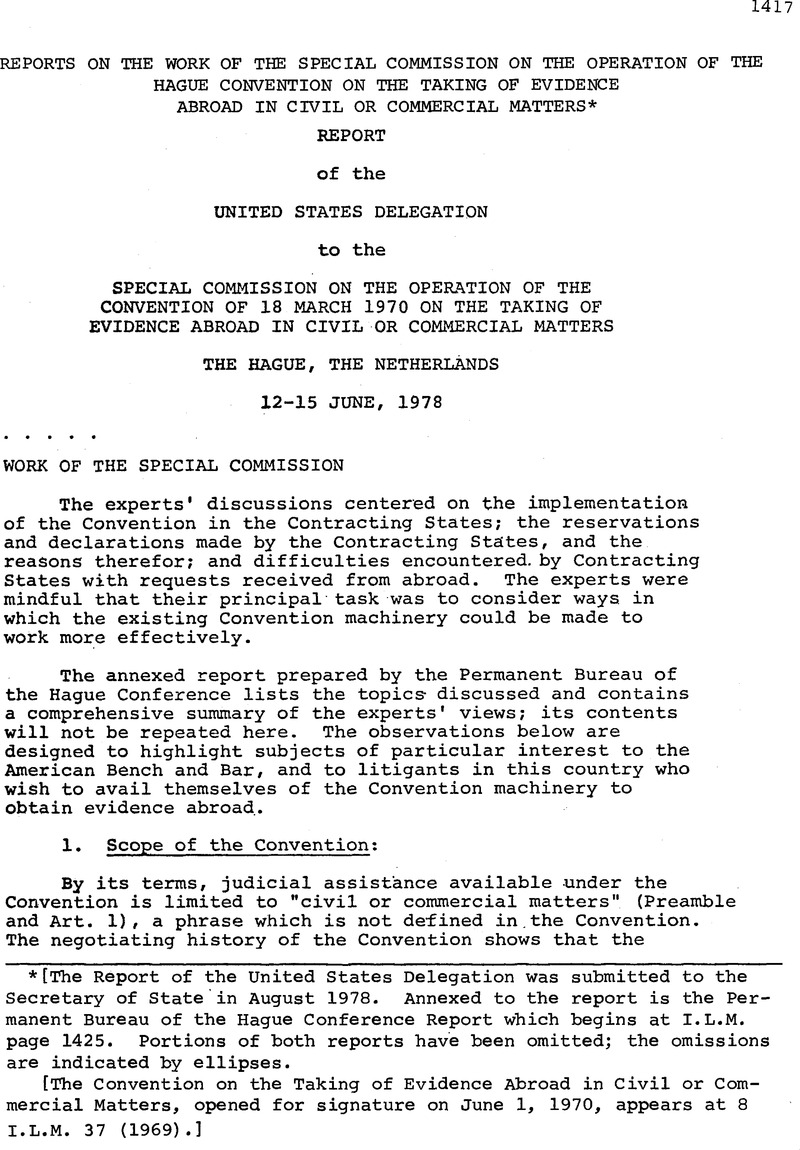Article contents
Reports on the Work of the Special Commission on the Operation of the Hague Convention on the Taking of Evidence Abroad in Civil or Commercial Matters*
Published online by Cambridge University Press: 20 March 2017
Abstract

- Type
- Reports
- Information
- Copyright
- Copyright © American Society of International Law 1978
Footnotes
[The Report of the United States Delegation was submitted to the Secretary of State in August 1978. Annexed to the report is the Permanent Bureau of the Hague Conference Report which begins at I.L.M. page 1425. Portions of both reports have been omitted; the omissions are indicated by ellipses.
[The Convention on the Taking of Evidence Abroad in Civil or Commercial Matters, opened for signature on June 1, 1970, appears at 8 I.L.M. 37 (1969).]
References
4 See, Actes et Documents de la onziéme session, vol. IV, pp. 56, 203 (1970).
5 Reprinted in 17 Int’l Legal Materials 805 (1978).
6 The Egyptian observer informed the Special Commission that under Egyptian law family relations matters are not considered “civil or commercial”.
7 The German observer informed the Special Commission that the Federal Republic is in the process of ratifying the Convention, and that implementing guidelines had already been issued by the Federal Ministry of Justice.
8 Although the Westinghouse letter of request did not refer to The Hague Evidence Convention, the English courts treated it as if it had been issued under the Convention. The Evidence (Proceedings in other Jurisdictions) Act 1975, which now authorizes English courts to execute foreign letters of request, was passed by Parliament in order, inter alia, to give effect to the Evidence Convention. Since both the United Kingdom and the United States had ratified the Convention, the English courts assumed that the Convention governed.
It should be noted, however, that the 1975 Act goes beyond the Convention in providing for the supplying of evidence to foreign tribunals when criminal proceedings have been instituted.
9 The court in the Radio Corporation case stated in relevant part:
“… it is plain that that principle [of discovery] has been carried very much further in the United States of America than it has been carried in this country. In the United States of America it is not restricted merely to obtaining a disclosure of documents from the other party to the suit, but there is a procedure … which allows interrogation not merely of the parties to the suit but also of persons who may be witnesses in the suit, or whom it may be thought may be witnesses in the suit, and which requires them to answer “questions and produce documents. The questions would not necessarily be restricted to matters which were relevant in the suit, nor would the production be necessarily restricted to admissible evidence, but they might be such as would lead to a train of inquiry which might itself lead to relevant material.” [1956] 1 Q.B. at 643-4.
10 United States v. Proctor & Gamble Co., 356 U.S. 677, M 3 (1958).
11 A number of delegates and observers requested to be furnished copies of the pertinent American law; all participants at the Special Commission have since been furnished a copy of the Federal Rules of Civil Procedure.
- 1
- Cited by




